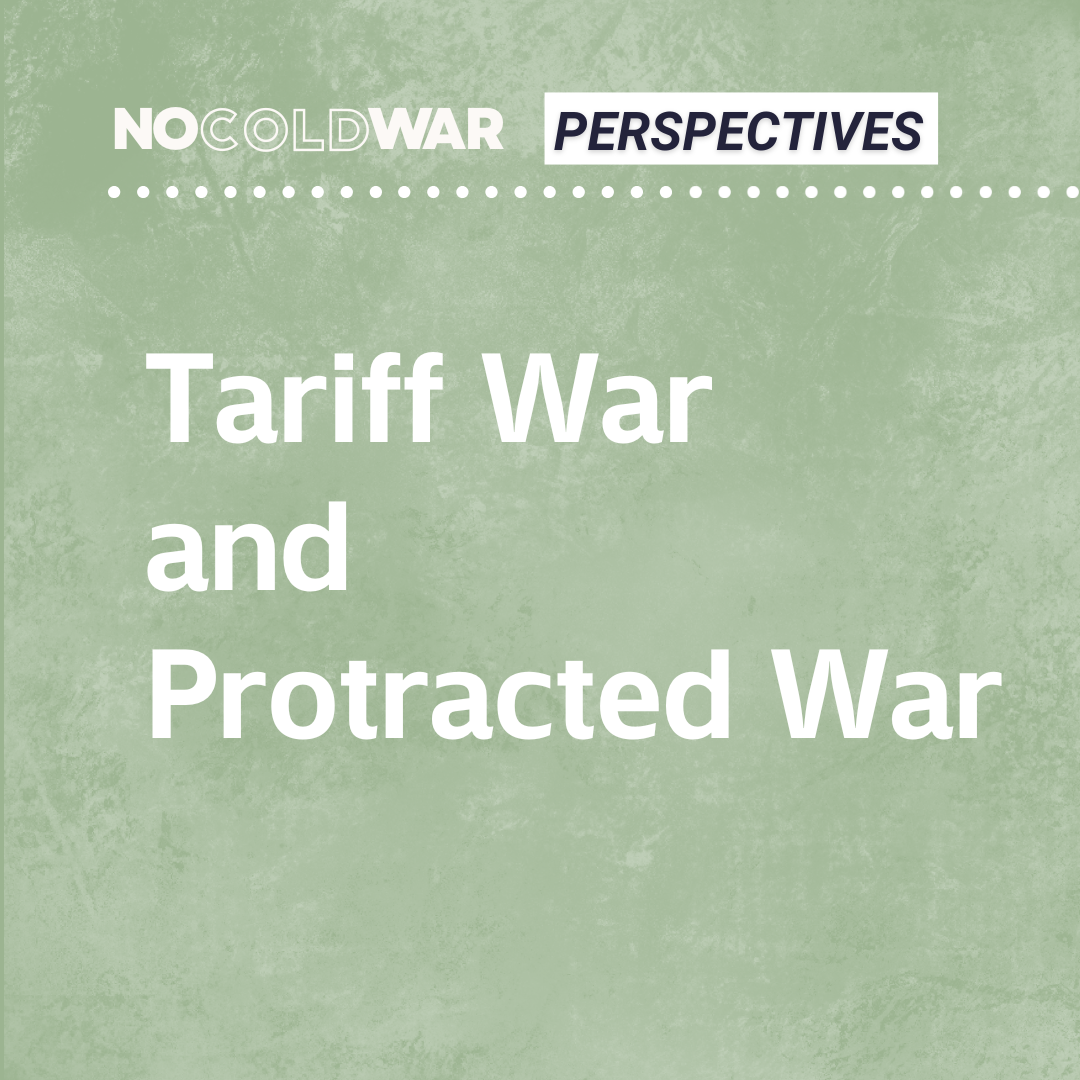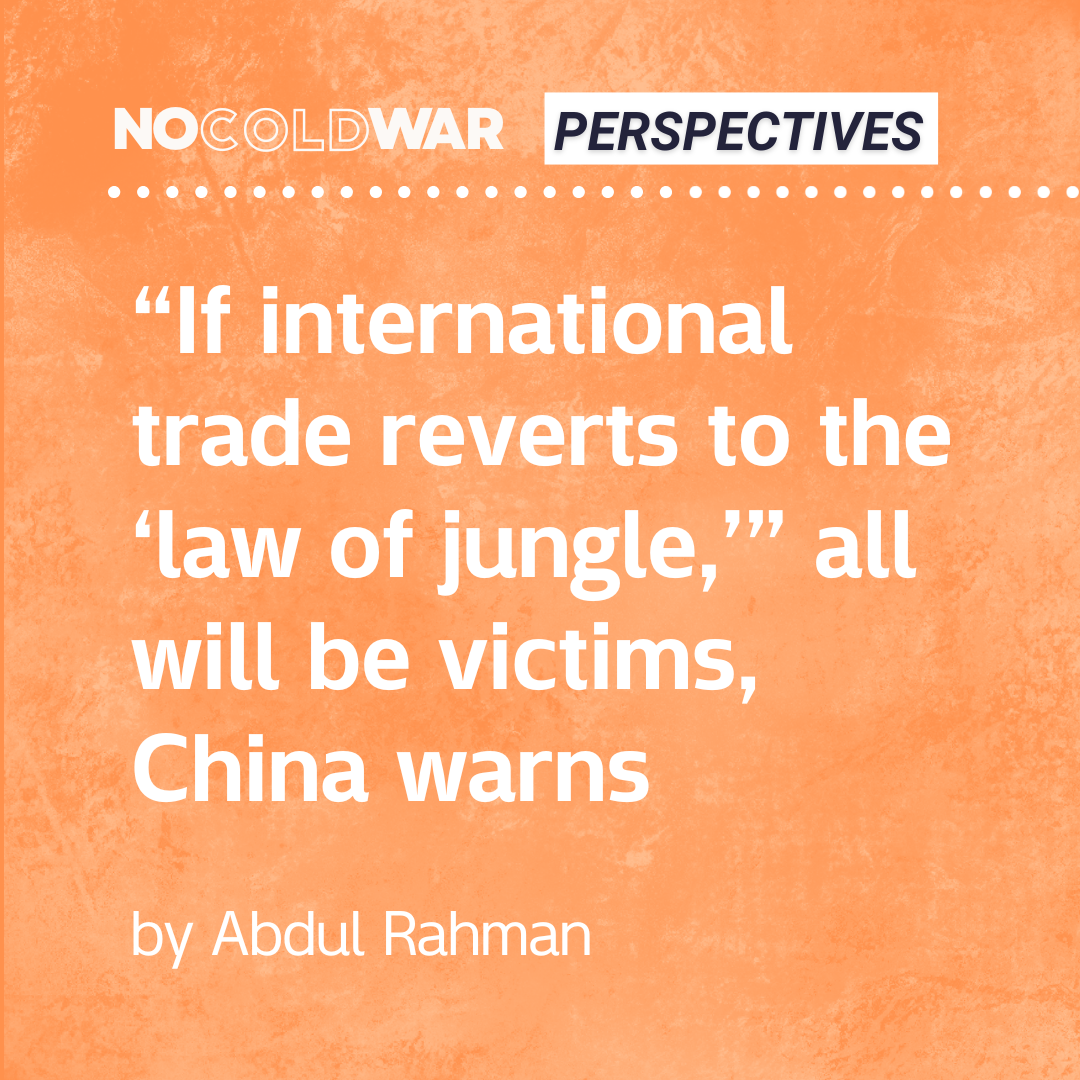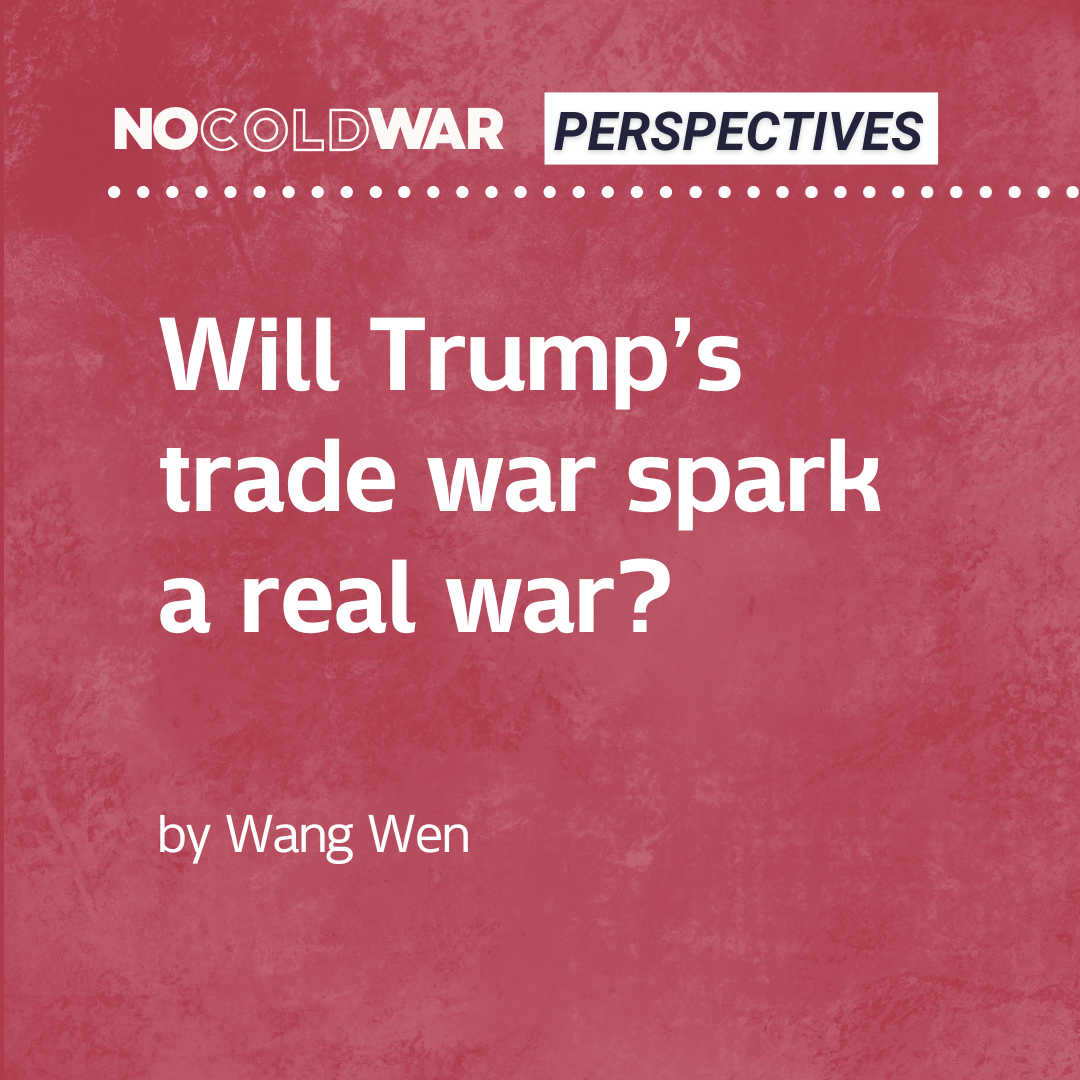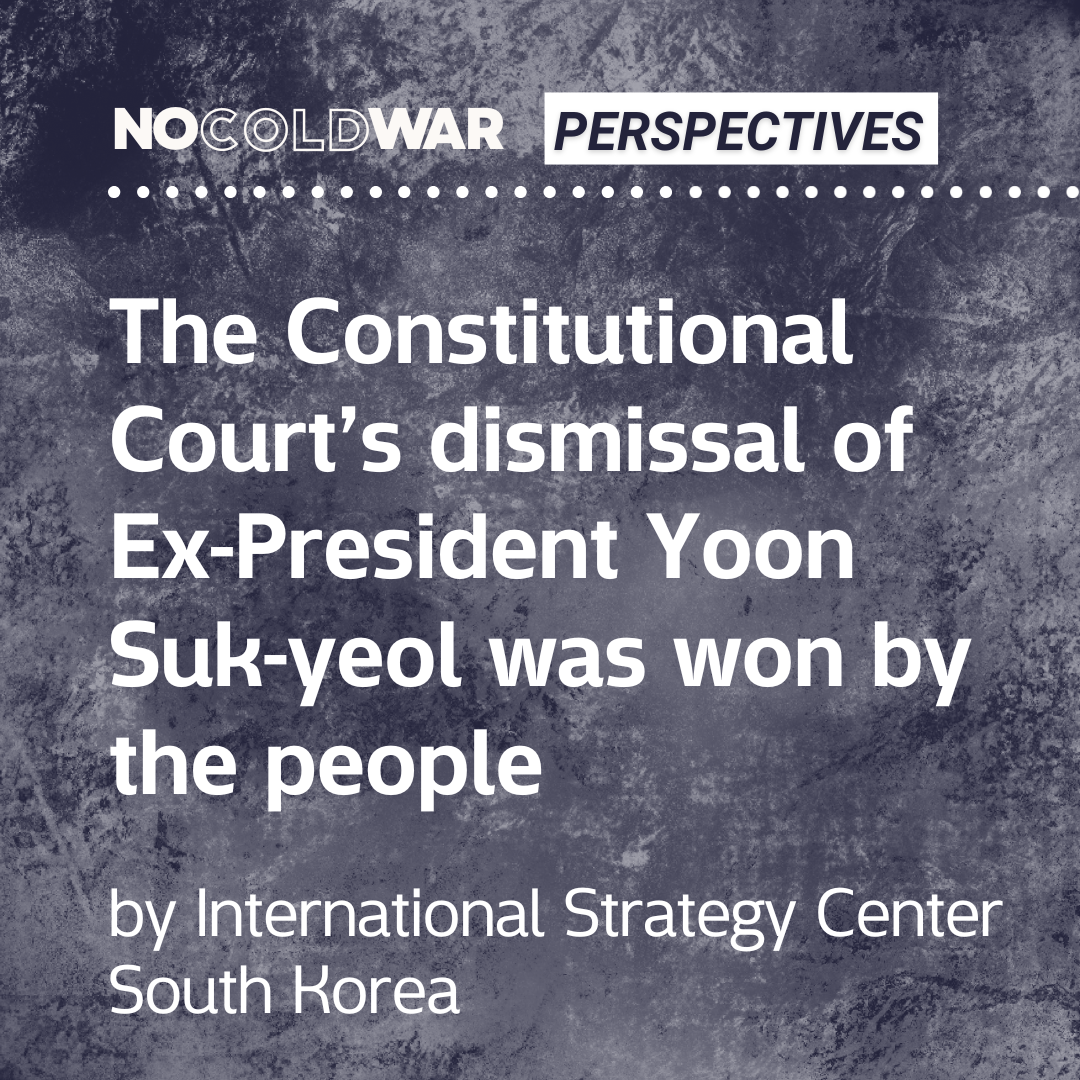It has been nearly a month since the Trump administration announced the imposition of so-called “reciprocal tariffs” on U.S. trading partners – thereby provoking a global trade war. But the development of the situation has greatly exceeded the expectations of the U.S.. Not only did the Chinese government take the lead in showing a clear attitude of being willing to respond to the U.S. “to the end” but the anti-bullying positions of the international community have become louder.
Due to a focus on this situation in which the U.S. is fighting indiscriminately, and China is responding to each move, the trend of China’s domestic public opinion is also changing. The views once put forward in some places of a “China must lose theory” and the “surrender at the speed of light theory” are disappearing. More and more people realize that China “knows what it is doing and it has cards to play in its hands”.
But at this time, however, new misconceptions have also appeared.
One is “quit while you are in the lead”, thinking that China’s “tough stance” will eventually be difficult to maintain. Now the Trump administration seems to be softening it is necessary to stop at the right moment, claim that a small loss is in fact a victory, and make concessions and compromises as soon as possible to reach an agreement to avoid entering a stage of a difficult strategic stalemate.
The other view is that “victory is in sight”. which, seeing the US’s chaotic actions and softened rhetoric, then thinks that “the U.S. is afraid”. This view optimistically predicts that the outcome of the trade war has already been decided and China will soon be able to achieve a complete victory.
So, why are these arguments wrong, and how can we rationally view this present round of Sino-US struggle?
The “Biography of Mao Zedong”, compiled by the Literature Research Office of the Central Committee of the Communist Party of China, wrote: “The work ‘On Protracted War’ is full of dialectics and materialism and it has universal value in the methodology for analysing things.”
In May 1938, after defeat in the battle of Shanghai, the loss of Xuzhou, with Wuhan in a critical condition, Chinese society was in chaos and with loud discussion. At this critical moment, Comrade Mao Zedong calmly analysed the situation at home and abroad, and spent seven days and seven nights writing a speech “On Protracted War”. In this article, Comrade Mao Zedong did not use many obscure and difficult concepts to reason with. The whole article uses dialectical materialism and historical materialism to analyse the War of Resistance against Japan, and forcefully refutes various false arguments, clearing away confusions for the Chinese people to win the War of Resistance against Japan.
To understand the correct path it is necessary to first study history. Although today’s Sino-US struggle cannot be equated with the War of Resistance Against Japan in its character, the results of both are related to the direction of the country and the dignity of the nation. Amidst the chaotic clouds it is a good idea to reread “On Protracted War” in order to understand the dialectical thought that “danger and opportunity coexist” as well as China’s strategic vision of why it will “secure a final victory”.
The Trump administration, which has existed for less than a hundred days, has unleashed a storm of tariffs. The aim was to secure a rapid victory, using huge pressure to force its opponents into defeat, and to reach rapid unequal deals in order to harvest the maximum benefits.
Facing this butchers knife, many countries have fantasized about ”feeding themselves to the wolves” in order to secure a moment of peace. But for China, it is simply unworkable to “ask for mercy”.
As the world’s second-largest economy China’s size cannot be concealed. even if China lowers its posture, cold war thinking would still see it as an enemy to be eliminated. The Trump administration wields the stick of tariffs to try to extort and blackmail. Its overbearing and cruel methods are unprecedented. This is an extreme provocation against China’s national sovereignty and dignity. We have no room for concessions, let alone any reason to give in.
This round of U.S. tariffs covers more than 180 countries and regions around the world, which constitutes serious damage to the world trading system. As a responsible power, China resolutely opposes the US bullying tariff behaviour, not only in order to defend its own sovereignty, security and development interests, but also to defend multilateralism and justice in the world trading system.
Stiglitz, Nobel laureate in economics and a famous American economist, once satirically wrote: “U.S. members of Congress rely on the money of the 1% for re-election, serve the 1%, and even rely on the 1% to reward them when they leave office.”
The various contradictions which have accumulated in American society today are ultimately caused by the deterioration of the capitalist system. As spokesperson for the interests of capital, the U.S. government is absolutely unable to “self-revolutionize” and solve the root causes of these conflicts. It has to utilise suppression, extortion, exploitation and other means to transfer its conflicts to the outside world. This means that whether it is a trade war, a tariff war, or some other war, what the U.S. resorts to is risky behaviour, a gambler mentality, with an attempt to divert attention from its own irreconcilable contradictions. It is destined to act against the trend of human history.
In contrast, today’s China, as an “enabling power”, has always adhered to the development concept of a community of human destiny. It firmly stands on the side of maintaining globalization and a normal trade order, advocates mutual benefits and a win-win situation, and opposes unilateralism.
At the same time, China’s development has never been the result of gifts from others. It is the result of hundreds of millions of people’s self-reliance and hard work. For more than 70 years since the establishment of New China, China has always broken through blockades and overcome attempts to suppress it and has accumulated a wealth of experience in these struggles. This determines that China’s “carrying through to the end” is not purely words but is in line with historical laws. It is just, progressive, and a just cause enjoys abundant support. “The times and the situation are on our side, and victory ultimately belongs to China.”
The people are the true creators of history. In “On Protracted War”, Comrade Mao Zedong summed it up as “the soldiers and the people are the foundation of victory.” In the contemporary context, this thought can be extended as “the whole people are united and concentrating on doing their work well”. That is, in the protracted struggle between China and the United States, the most critical issue is to achieve China’s own development, improvement, progress and growth.
From the perspective of national strategy, this can be seen in the proposing of a new development pattern with the large domestic economic cycle as the main force, and the mutual promotion of the domestic and international twin cycles; to propose the development of new quality productive forces, shaping the development of new kinetic energy and advantages for growth; to deeply promote the construction of a unified large market across the country. Regarding the long-term nature of the Sino-US competition the Party Central Committee has already predicted that it will take the initiative to lay out a plan for the competition of major powers. This is the root of our confidence in dealing with attempts to contain and suppress China.
From the perspective of industrial development, both the Trump and Biden administrations are addicted to imposing technological sanctions, but they in reality imprison themselves, and even give rise to what might be called China’s “crisis dividend”. In recent years, China has concentrated its most advanced resources to break through the technological “chokepoints” and accelerate the domestic progress of key link industries such as artificial intelligence, big data, integrated circuits, and new energy. These have grown rapidly, showing strong capabilities in the strategic mobilization of resources and concentrated breakthrough capabilities.
At the social level, having dealt with various shifts, Chinese people have become more and more aware that the words the “imperialists desire to destroy China never dies” is not a hollow phrase. Only by daring to fight, and being skilful at fighting, can we turn danger into opportunity and secure safety. After the Trump administration launched this round of trade war, many patriotic stories have unfolded: such as e-commerce platforms helping companies reliant on foreign trade to shift to domestic sales, consumers strongly supporting domestic production, shareholders following the “national team” to protect the country, and students declaring “scientific research serves the country”. Mainstream public opinion is highly united and has shown a strong awareness of the historical situation. This national ability of self-awakening, self-regulation, self-pressure, and self-optimization is the core support for the ultimate victory in the protracted struggle. .
Comrade Mao Zedong once emphasized: “The Chinese people are ambitious and capable, and they will catch up with and surpass the world’s advanced level in the far from distant future.” Today’s China is step by step turning that into a reality.
“Each generation has its own war of Resistance” [against Japan] and “each generation has its own Battle of Triangle Hill” [a major victory by China over the U.S. during the Korean war], these are popular comments on China’s internet after the United States provoked the new round of trade wars. History never repeats itself, but it always rhymes. Today, revisiting “On Protracted War” is not only because it provides us with a clear framework for strategic understanding, but also because the methodological wisdom, dialectical materialism, and mass line thinking it contains offers great enlightenment for international struggles in the new era.
By always adhering to sober strategic judgment, scientific methods of thinking, and a firm will to act, we will definitely be able to successfully complete this “long march in the new era”.
The above article, analysing China’s response to the tariff war launched by the U.S., was originally published in Beijing Daily under the title “Today, it is necessary to reread ‘On Protracted War’”. It was also published online here in Chinese.




